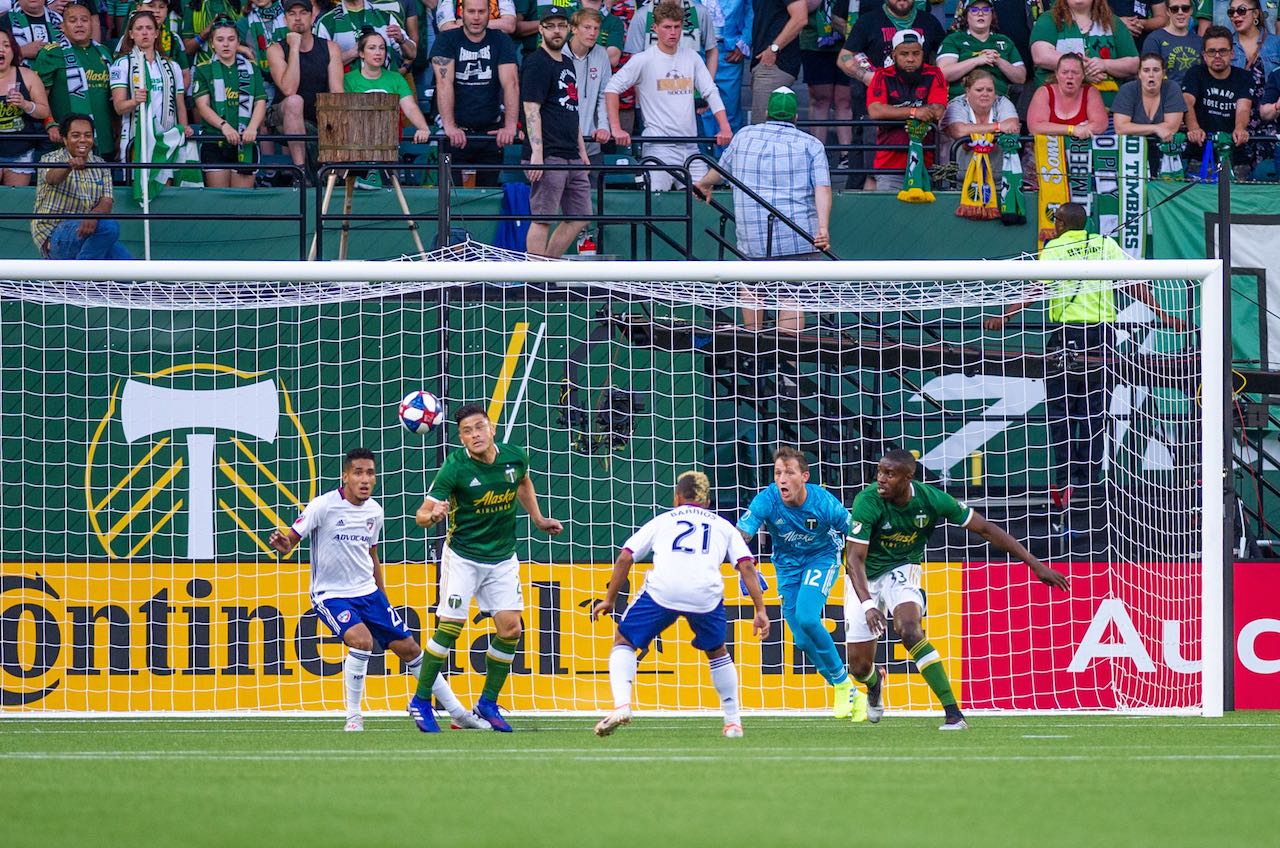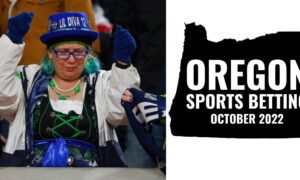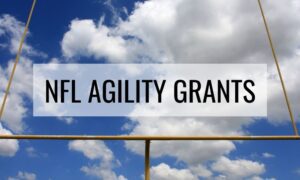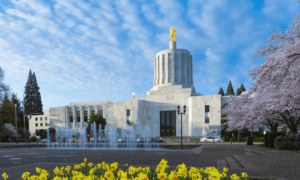Lottery Reveals Oregon Sports Betting Details, Including Launch Date In 2 Months

In two months, another state will join the ranks of legalized online sports betting. As a result, Oregon will become the first to do so in the Northwest.
The Oregon Lottery has a three-phase rollout planned for its regulated industry, beginning with an online offering in time for the first Sunday of the NFL season, which is scheduled for Sept. 8.
Lottery spokesman Matt Shelby provided Playin USA with a more detailed look into the state’s sports betting plans, outlining the lotto’s intentions to introduce an online sportsbook and self-service kiosks and the re-introduction of a game similar to the Sports Action parlay game Oregon once offered.
Additionally, Shelby noted how the online lottery product could potentially include purchasing scratch-off and draw tickets, such as Powerball and Megabucks. However, Shelby emphasized, mobile video lottery games resembling video lottery terminals (VLTs) found at lotto retailers will not be included.
Indeed the Oregon Lottery has plenty on its plate, all while having a bit of controversy spring up about its sports betting partner, SBTech. Shelby, though, emphasized there should be no concern regarding SBTech’s dealings. After all, following extensive investigations, the lottery isn’t.
Online sports betting alive in Oregon
In a relatively rare instance, Oregon’s first legalized sports betting offerings will come via mobile devices.
An Oregon Lottery-branded online sportsbook powered by SBTech is expected to hit the market in time for Week 1 of the NFL season.
The path to going online was cleared for good just last month after several legislators attempted to prohibit such gambling.
Earlier this year, an amendment to House Bill 3389 was proposed that disallowed the Oregon Lottery from initiating or operating a lottery game (such as sports betting) “via the Internet” or “a personal computer, mobile device or other personal electronic device.”
Oregon Lottery ‘not concerned’ about amendment
Despite the proposal, Shelby said he and others at the lottery were not worried about the future of online wagering in Oregon.
“We always had very strong support from the governor’s office,” Shelby said. “I don’t think we were ever all that concerned.”
Shelby added: “Legislators started ear-marking revenue from sports betting to help pay down some of the public employee retirement liability. There were a number of bills that made it through, or bonds that were approved, that used lottery revenue as the collateral for capital ponds. While on one hand a few legislators had general concerns about the direction we were going, as a body, the legislature was moving forward and dedicating that money.”
Indeed, state support showed during a June 10 meeting of the Senate Committee on Finance and Revenue. A month earlier, another committee referred the proposed amendment to finance and revenue. At the beginning of June’s hearing, Sen. Mark Hass, chair of the committee, made it clear that “no action will be taken” on the proposed amendment.
Per Shelby, no action essentially means the bill dies. And Oregon’s path to online sports betting is obstacle-free.
How Oregon mobile betting will look
In the Oregon Lottery’s corner is a veteran sports betting partner in SBTech. The company operates in New Jersey, Mississippi, and Arkansas, among numerous other jurisdictions worldwide.
Specifically, SBTech provides services to Golden Nugget Sportsbook in New Jersey. Oregon sports betting, Shelby noted, will closely mirror what customers find there in terms of offerings.
That is, except for collegiate markets. Shelby said Oregon will launch with lines for professional sports only.
“We’re not going to say ‘never,’” Shelby said about collegiate wagering. “But out of the gate, we felt that it was prudent to stick with pro sports at the moment.”
No collegiate sports…
One could argue the decision to exclude collegiate markets is tied to state universities receiving a cut of lottery proceeds. Shelby denied this reasoning. Instead, he detailed Oregon’s rocky history with the NCAA, which included the association refusing to stage championship events in any state that offered sports betting. Such a threat led to Oregon dissolving Sports Action in 2007.
Shelby added that some university officials also expressed concern about crossing sports betting with collegiate sports.
“We want to make sure our university system is OK with where we’re going,” Shelby said. “So we thought it was easier to roll out with professional sports first.
“Frankly, most Oregonians aren’t used to a regulated betting market. We have lots of projections about what we think betting patterns are going to be and what revenue is going to be. But those are just projections. We’ll see what the market actually bares. At that point, you can start having conversations about what sports betting is yielding and what it could yield if we offered NCAA.”
… but that could change later on
Shelby pointed out that the lottery is “under no illusions” that excluding collegiate action doesn’t “leave money on the table.”
“We know that,” Shelby said. “But we have a dual mission: It’s maximum profit for the state of Oregon commensurate with the public good. If we were only interested in maximum profit, absolutely we’d offer collegiate betting. But we’re not a for-profit enterprise. We’re a state agency. … We approach things a little more cautiously than a casino.”
Kiosks to come months after OR sports betting launches
In the early months of 2020, Oregon expects to debut self-service kiosks at retailers throughout the state. Initially, the lottery would begin with “beta” kiosks before rolling out more at a later date.
Shelby indicated that current lottery retailers will obviously have the opportunity to house these machines. In fact, so would other businesses that may not be at the moment. The third phase of rolling out Oregon sports betting involves implementing a variation of the old Sports Action parlay game that would also be featured at retailers.
“Likely you would see some trial offerings to see how different markets respond to (the kiosks),” Shelby said. He noted that the statewide rollout would come “six or so months” after the initial introduction.
“I think we’ve got a strong
retail network and we have a strong support system within the lottery that we use and lean on to support existing video lottery,” Shelby said. “The infrastructure is there. It’s just training people to support new hardware and working with retailers to figure out (where the machines would go).”
Where would kiosks go?
At the moment, Shelby said, the lottery has not “gotten too far down the road” in determining which and how many retailers would host kiosks.
However, he added, “you can’t just walk in and say, ‘I’m a new business, I want (kiosks).’ We’re going to start with a number that makes more sense. … We want to make sure we’ll be placing these kiosks in places that make sense and are viable.”
Retailers will be afforded up to six machines. Shelby said he was unsure if there was a limit on how many kiosks the lottery could introduce to the state.
“I think really the question is how many do we want to have in the market,” he said. “I don’t anticipate there’s going to be any shortage on the vendor side. I think it’s more of seeing what makes more sense for us.”
In terms of which retailers gain priority, logically it would make sense to use sales and revenue figures as determining factors.
However, Shelby said, “we know that sports betting draws a new type of consumers. So we can’t rely on data from our current offerings. We know there are potential retailers out there (that do not have lotto products) that may be interested in having a sports betting kiosk.”
OR Lottery goes online, but no game expansion
While the Oregon Lottery begins modernizing its offerings, it will go without mobile games resembling VLTs found at retailers.
Shelby said the lottery certainly has long-term plans “to provide mobile convenience toward Powerball or Megabucks tickets.” When that day comes, customers would be able to purchase and check the numbers on said tickets while also having the ability to play scratch-offs.
But that is the extent to which the lottery will go.
“That matches our revenue vs. public good (balancing act),” Shelby said. “We know some Oregonians should not be playing. Right now, the access to those games is limited to Oregon Lottery retailers. And those retailers close, and you have to go home.
“We don’t want to be in a position where someone is spending hours at a bar and playing lottery and going home and grabbing a six-pack out of their fridge and then playing at home.”
So long as current state and lottery leadership are in place, Shelby emphasized, that will remain the plan for the Oregon Lottery.
SBTech controversy has no effect on OR Lottery
Recall when the Oregon Lottery selected SBTech as its provider earlier this year. During the waning stages of that process, competitor Scientific Games, whose SG Digital brand was also being considered, submitted a last-minute protest to the lottery.
A letter sent to the lottery and obtained by Legal Sports Report suggested that SBTech has ties to operators in gray or black markets.
SG Digital urged the Oregon Lottery to thoroughly investigate SBTech and reconsider its selection. The lottery, following investigations by employees and Oregon State Police, determined there was seemingly no black marks to void its contract with SBTech.
Since that time, Shelby said, few have raised questions about the lottery’s partner.
“I don’t know if there is a growing concern about SBTech,” Shelby said. “We know the sports betting industry is a highly competitive industry. We know there’s a vendor that bid for this contract and did not get it (that) made some claims. We looked into those claims.
“Any time we have a vendor that we do business with that has a direct tie to a game or the ability to determine an outcome of a game, we have to do a very thorough background investigation. … As the concerns were raised, we took them seriously. State police investigated. At the end of the day, they didn’t surface anything that was worth moving forward.”
What about that DraftKings deal?
Late last week, Legal Sports Report received word that DraftKings was reportedly acquiring SBTech, though details and timing of the deal were no disclosed.
The transaction would land DraftKings, a major NJ sports betting player, with its own in-house platform provider.
As legalized sports betting expands nationwide, DraftKings is certainly eyeing avenues into untapped markets. With SBTech, it would have the vehicle to do so.
Shelby acknowledged he heard about the news. But he said it would not affect Oregon sports betting, at least from the lottery’s standpoint. The online sportsbook and kiosks would still be lottery-branded.
The only difference, Shelby said, is “it would require us to do due diligence on the new owners. It would require more work for us. Due diligence is never done.”
More sports betting operators on tap?
While Oregon will debut as a single-operator industry, the future remains open for potentially more brands entering the state.
Oregon gambling isn’t very widespread, except with the lottery and at tribal casinos. Those tribes, Shelby said, have a clause in their compacts with the state. Anything the lottery offers as a game, the tribes can do the same.
Essentially, once sports betting goes live under the lottery umbrella, tribal casinos will have the opportunity to explore bringing in their own partners and their own sportsbooks.
“Once we offer sports betting and now that it’s legal in the state,” Shelby said, “they can then work with the state of Oregon to offer it as well with whoever they wanted. That negotiation is with the governor’s office and them.”
Oregon Lottery on threshold of launch
All told, Oregon is looking at a 12-to-18-month rol
lout for its sports betting offerings. And it all begins, the lottery hopes, during opening weekend of the NFL season.
“I think we’re still real close to getting there,” Shelby said, adding the caveat that it’s not a “flag-in-the-ground” target date.
“We want to make sure we respect the credibility. That means we’re going to be real sure that it’s a good product and people think it’s good. If that means we have to take another week or so, we’ll do that.”








